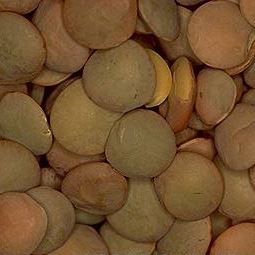 |
An innovative plant growth promoter for organic and traditional farming
|
Lentil |
|
Materials used in this chapter were published in the book Biostimulant Albit for increasing yields and protection of agricultures against diseases, A.K. Zlotnikov, Ed. Prof. À. Melkumova. All-Russia Institute of Plant Protection, Russia, 2006.
 Lentil Ervum
lens L. (syn. Lens esculenta Moensch) is the valuable legume
food and forage crop.
Lentil Ervum
lens L. (syn. Lens esculenta Moensch) is the valuable legume
food and forage crop.
On lentil, Albit is applied as antidote for decrease of side phytotoxic effect of herbicides. In Russia, Albit is officially registered as a plant growth regulator of lentil. Albit increases field germination capacity, accelerates plant growth and development, improves plant resistance to unfavorable conditions of the environment, provides defense against plant diseases, increases lentil yield and improves the yield quality.
Application recommendations. It is recommended presowing seed treatment (50-150 mL/t) and foliar spraying at the budding stage (30-100 mL/hà, ÂBCH 50-60). Albit may be applied as antidote in tank mix with pesticides according to their perspective recommendations. Maximal recommended doses are applied in combinations with pesticides for increase of stress-resistance of plants.
Depending of treatment method and dose, yield increase of lentil after Albit treatment is 0.07-0.29 t/hà, and average yield increase according to all trials – 0.19 t/hà or 24.9% to control.
On lentil, Albit has been tested since 2001 in field trials of All-Russia Institute of Vegetable Selection and Seed Breeding (Moscow oblast), All-Russia Research Institute of Legumes and Groat Crops (Oryol oblast), Russian Institute of Sorghum and Maize (Saratov) and also in other institutes and farms. The following varieties of lentil were used in trials: Penzenskaya-14, Rauzà, Nadezhda and others. In field trials a high Albit efficacy was shown.
In field trials of All-Russia Institute of Vegetable Selection and Seed Breeding (Moscow oblast, 2001) seed treatment of lentil var. Penzenskaya-14 with Albit (30-50 mL/t) + following foliar spraying (30-50 mL/hà) were conducted. After Albit treatment, field germination and length of shoots were increased by 5% and 10%, respectively. Yield in control was 0.99 t/hà. Depending on treatment method, lentil yield increase after Albit treatment was 0.06-0.13 t/hà and in average 0.09 t/hà or 9.1% to control.
In Oryol oblast (All-Russia Research Institute of Legumes and Groat Crops, 2006) seeds of lentil var. Rauza were treated with Albit in the following doses: 50, 100, 150 and 300 mL/t. Untreated seeds were used as a control. Thus, seed treatment with Albit promoted to improving of sowing qualities of treated seeds (Fig. 1). Germination energy and laboratory germination increased by 1-7% and 3-4%, respectively; length of roots and sprouts by 8th day after sowing increased by 4-17% and 6-22%, respectively.
 |
 |
Fig. 1. Influence of seed treatment with Albit on lentil germination (pot experiment of All-Russia Research Institute of Legumes and Groat Crops, Oryol oblast, 2008)
The best results were obtained in variant with Albit in dose 150 mL/t. This dose was used in the following field experiment. After Albit treatment, field germination increased by 9% over control. In variants with Albit the number of seeds and pods per plant, seeds in pod, weight of 1000 seeds, weight of seeds per plant were increased by 20%, 10%, 7%, 3%, 23%, respectively (Fig. 2). As result of improvement of growth parameters, yield increased by 0.29 t/hà (23.4% to control).

Fig. 2. Influence of Albit treatment on lentil growth (field trial of All-Russia Research Institute of Legumes and Groat Crops, Oryol oblast, 2007)
The same results were conducted on other field (All-Russia Research Institute of Legumes and Groat Crops, Oryol oblast, 2007). After seed treatment with Albit in dose 150 mL/t, yield of lentil increased by 0.31 t/hà (by 33.7% higher than in control). This method of Albit treatment with dose 150 mL/t decreased plant infestation by root rots by 30% at the budding stage–beginning of flowering. Level of disease development was lower, than in control by 7.5%, biological efficacy was 43% (Albit in ca. 2 times decreased plant infestation by root rots).
On lentil var. Nadezhda field trials were conducted from April to October of 2009 in Saratov oblast (Russian Institute of Sorghum and Maize). Albit was used for seed treatment and for foliar spraying at the stage of 4-5 leaves in doses 20, 40, 60, 80, 100, 120 and 150 (mL/t + mL/hà). Standard based on Bacillus subtilis was applied in recommended doses. Background treatment: in control and in all other variants foliar spraying with imazethapyrà (0.4 kg/hà) was conducted at the stage of 3 true leaves.
In conditions of dry weather of 2009 and low disease development, Albit on lentil had a high efficacy (100-150 mL/t (hà)) over control and standard variants. These doses had positive influence, first of all, on field germination (increased by 17.3-18.8%). This allowed to increase the number of plants per m2 and lay the foundation for high plant productivity. Foliar spraying with Albit at the stage of 4-5 leaves increased this positive effect. Yield in these variants were higher over control by 0.217-0.29 t/hà (32.1-42.8%).
Thus, both in conditions of Oryol oblast and in dry conditions of Saratov oblast, treatment with Albit gave a high yield increase of lentil (more than 20%).
In the following Table, you may see all reports on performance of Albit on lentil, available in English. For all available reports, please see corresponding table on the Russian webpage:
¹ |
Year |
Country |
Region |
Institute / Farm |
Report |
1. |
2001 |
Russia |
Moscow region |
All-Russia Institute of Vegetable Selection and Seed Breeding |
|
| NOTICE: | Information contained on this page is provided according
to the Terms and Conditions located at
www.albit.com/application/disclaimer.php
|